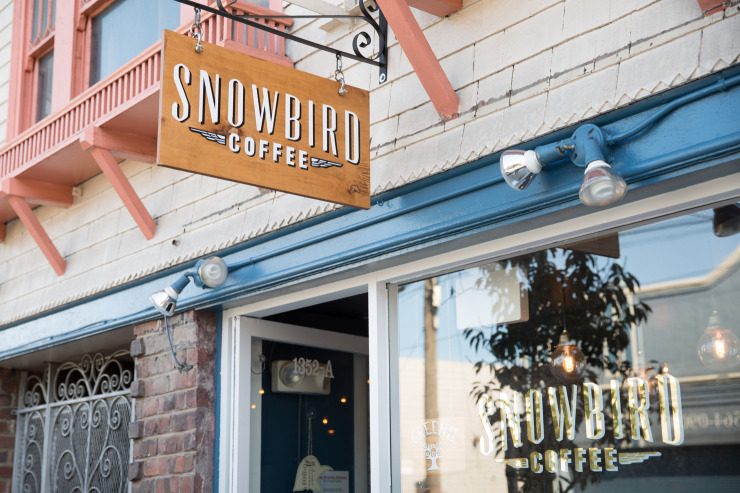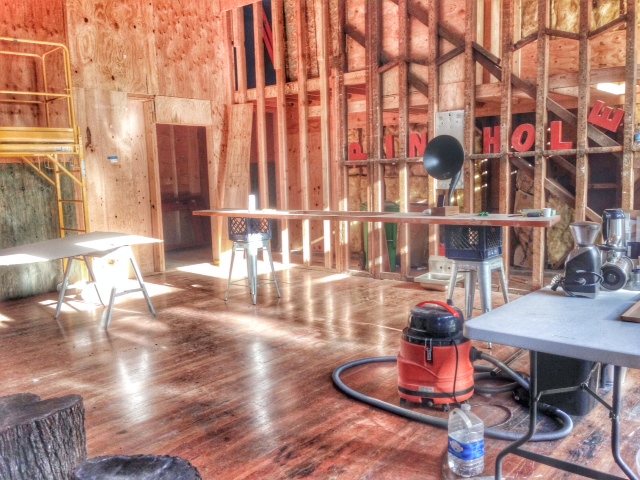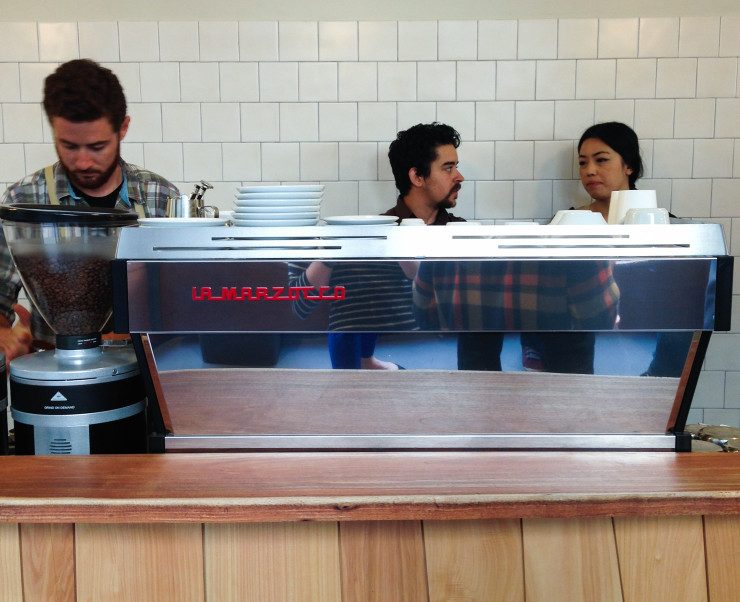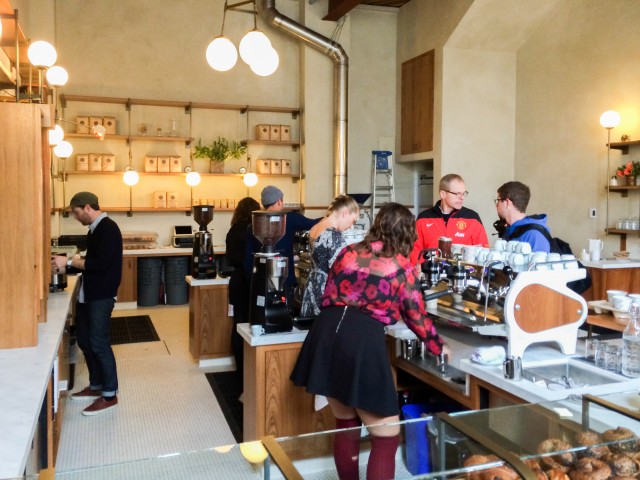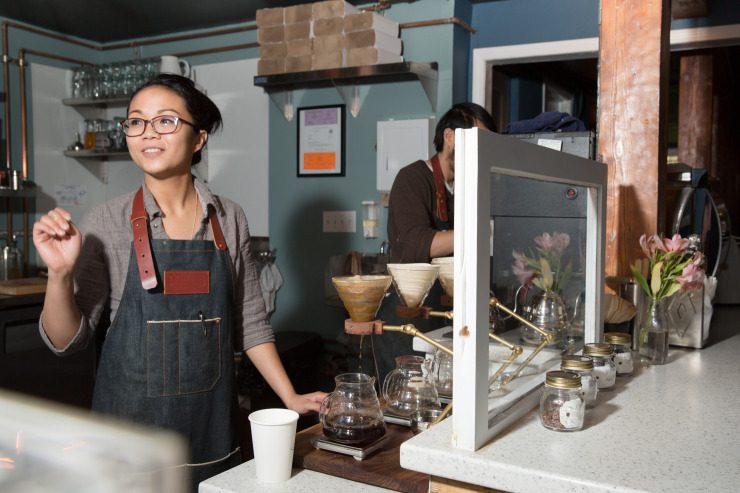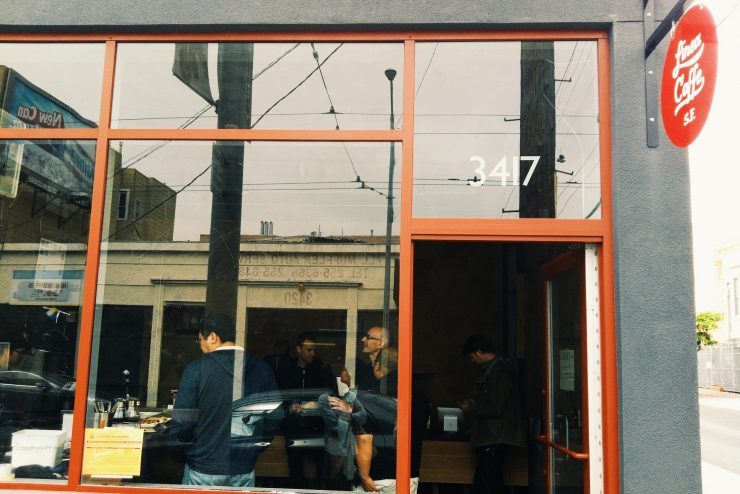It’s hard sometimes, especially in a city as crammed with amazing coffee shops as San Francisco, to see the arrival of another specialty cafe as anything but a drop in our vast coffee ocean. Either it’s a Blue Bottle or a Ritual opening just one more store, or a new, hip roaster, or, more often than not, it’s a new business altogether, finding its place in a neighborhood no one imagined would ever think to find a specialty coffee shop. This is a city full to the brim with coffee shops.
Behind each of these coffee shops is, and always will be, a group of dedicated coffee professionals who’ve taken the great risk, financially and personally, of investing themselves into a space where they can, in the words of Pinhole Coffee’s JoEllen Depakakibo “curate a community” as they see fit. Often, in a city that more and more seems to scorn the very idea of change, we dismiss a new coffee shop as “hipster gentrification” or as “oversaturation” without taking into account the very real process, the trials and tribulations, that individuals go through just to throw the doors open—let alone keep their freshly anointed coffee shop afloat.
So to shed a little light on the difficulties, and the ensuing rewards, that come with opening a cafe in a competitive landscape, we sat down with five coffee professionals at five San Francisco coffee shops—all of which opened somewhere between the last three months and the last two years, big and small, old and new, from Bernal Heights to the Financial District—to pick their brains on just why they wanted to open a shop, the best and worst parts of opening a cafe, the lessons learned, and much, much more.
Opening a cafe in San Francisco isn’t an easy task—there’s a bureaucracy seemingly unwilling to support new businesses, a fickle population, and the mountainous to-do list that comes with opening any new enterprise. To take up the unenviable process of doing just that requires a certain will and a certain desire to bring something to light. Paramo Coffee’s Gabriel Boscana wanted to bring something new to the Embarcadero, “We wanted to bring really, really good coffee and service to an area that had a lot of coffee shops, but not many GOOD coffee shops,” he said. Eugene Kim of the Inner Sunset’s Snowbird Coffee had dreams of leaving behind a high-stress life for the relaxing climes of a small coffee shop. “It was the complete opposite,” Kim says, “it’s a lot of work to open up a cafe.” Coffee legend Andrew Barnett had recently walked away from his first coffee baby, Ecco Caffè, and was looking for something new. “When it ended, I thought ‘What do I do?’” he says, “I wanted good producers, I wanted to roast the coffee, develop the coffee, and have a place to serve it in San Francisco.”
Once the wheels of a new opening are set in motion, concerns, a lot of them, will pop up. Pinhole’s Depakakibo faced customer resentment before she even had a chance to show them what she had to offer. “We had to deal with this initial backlash of people who thought there were too many coffee shops in Bernal,” Depakikibo says, “Our biggest issue was trying to change the views of people in the neighborhood, to show them what our intention was—community and coffee.”
Justin and Jerad Morrison, the owners of Sightglass, found themselves, almost halfway through the initial build of their space on 20th, suddenly unhappy with what they were doing. Jerad Morrison told me, “We totally stopped and did a redesign. We just weren’t inspired by what we were doing. We got in here and we had an idea and the more we went down that path, the less excited we were.” The Morrisons went “back to the drawing board” re-doing everything from the layout to the flow to the finishes. “You only have one shot at it,” Jerad Morrison says, “we had the foresight to know that we had a shot and a half, and we’re better for it.” Linea’s Barnett had different preopening nightmares, like lack of room for storage, refrigeration, or a place for a bathroom— let alone a boarded up porta-potty a long-departed construction crew had left outside intermittently surrounded by used syringes, broken glass, and people peeing.
Then the doors open, and you’re suddenly faced with defining yourself as a unique, skilled coffee shop in a city bubbling over with them. Depakakibo’s defining goal was to create a space to bring her community together. “People have been living in [Bernal Heights] for 10, 50, 80 years, and they see each other walking their dogs and they still don’t know each other.”
In response, Depakakibo designed Pinhole like “another living room” where no one had the option of having their back to anyone else. “We wanted to curate a certain space that, well, forced relationships.” To further this she hired people based not on their experience but who they were as people. “We’ve got people here who’ve never had coffee jobs, but I made it clear that I was looking for people that understood connecting with customers. Skills you learn, personality and attitude are something that come from within.” In exchange, Depakakibo has given up some of the simpler things in life, “I don’t sleep. I mean, right now, in this first year, it’s appropriate for the owner to be the manager, but balancing that, it’s the hardest thing.”
In these first few years, running a cafe is indeed much more than a full-time job. Barnett says, “It takes a lot of being here. Retail has a life of its own and it needs constant care and nurturing. I think it’s kind of like having a child.” Snowbird’s Kim and his business partner found their dreams of laid-back business-owning were just that—dreams—but still find the experience entirely enjoyable. “It’s a good stress,” Kim says, “A rewarding stress.”
It isn’t all hard work and sacrifice though: many of the highs are particularly memorable. “Opening the door man,” Barnett recalls, “just seeing this thing become activated; seeing customers sitting outside, drinking coffee—it’s a dream.” Kim cites Snowbird’s first day as his favorite so far, “We opened on a Sunday, and I was driving back from a wedding the Saturday before. I drove straight back, we worked ‘till 5 a.m., headed home, showered, and were right back to open at 7 a.m. We drank a lot of coffee to get through that day.” Pinhole’s community is what Depakakibo loves, “There’s one little baby, named Charlie, she was 5 months old when I met her. She was the first person I met in the family. And seven months later, she’s going to have her first birthday here. They come here everyday just to let me hold her.”
At the end of the day though, it’s always about the lessons learned. Justin and Jerad Morrison look back and are happy to have taken the time to make the space exactly what they wanted. “It took us a year to complete this space,” Justin Morrison says, “but in the end, it’s this realized thing and all the details matter on this experiential level.” Paramo’s Boscana struggled early on with an area unappreciative and unknowledgeable about specialty coffee, but has watched it expand and solidify right in front of his eyes. “This area is different from any environment I have been in with regards to specialty coffee. It has blown me away to see that good coffee and good service can absolutely create a community and a culture if you put effort into curating it.”
And as Depakakibo emphasizes, the best thing a cafe operator can do to remain unique is simply “be yourself.”
“I don’t want to impress anyone,” she says. “I mean, I don’t want to say it’s a breeze, but if you have good intentions—everything’s easy.”
Noah Sanders is a Sprudge.com staff writer based in San Francisco, and a contributor to SF Weekly, Side One Track One, and The Bold Italic. Read more Noah Sanders on Sprudge.
The post Tales Of The City: Bay Area Cafes Look Back At Their First Year In Business appeared first on Sprudge.


